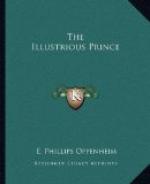The reporter sighed. He was, after all, a little disappointed. Mr. Coulson was obviously a man of common sense. His words were clearly pronounced, and his reasoning sound. They had reached the courtyard of the hotel now, and the reporter began to express his gratitude.
“My first drink on English soil,” Mr. Coulson said, as he handed his suitcase to the hall-porter, “is always—”
“It’s on me,” the young man declared quickly. “I owe you a good deal more than drinks, Mr. Coulson.”
“Well, come along, anyway,” the latter remarked. “I guess my room is all right, porter?”—turning to the man who stood by his side, bag in hand. “I am Mr. James B. Coulson of New York, and I wrote on ahead. I’ll come round to the office and register presently.”
They made their way to the American bar. The newspaper man and his new friend drank together and, skillfully prompted by the former, the conversation drifted back to the subject of Hamilton Fynes. There was nothing else to be learned, however, in the way of facts. Mr. Coulson admitted that he had been a little nettled by his friend’s odd manner during the voyage, and the strange way he had of keeping to himself.
“But, after all,” he wound up, “Fynes was a crank, when all’s said and done. We are all cranks, more or less,—all got our weak spot, I mean. It was secretiveness with our unfortunate friend. He liked to play at being a big personage in a mysterious sort of way, and the poor chap’s paid for it,” he added with a sigh.
The reporter left his new-made friend a short time afterwards, and took a hansom to his office. His newspaper at once issued a special edition, giving an interview between their representative and Mr. James B. Coulson, a personal friend of the murdered man. It was, after all, something of a scoop, for not one of the other passengers had been found who was in a position to say anything at all about him. The immediate effect of the interview, however, was to procure for Mr. Coulson a somewhat bewildering succession of callers. The first to arrive was a gentleman who introduced himself as Mr. Jacks, and whose card, sent back at first, was retendered in a sealed envelope with Scotland Yard scrawled across the back of it. Mr. Coulson, who was in the act of changing his clothes, interviewed Mr. Jacks in his chamber.
“Mr. Coulson,” the Inspector said, “I am visiting you on behalf of Scotland Yard. We understand that you had some acquaintance with Mr. Hamilton Fynes, and we hope that you will answer a few questions for us.”
Mr. Coulson sat down upon a trunk with his hairbrushes in his hand.
“Well,” he declared, “you detectives do get to know things, don’t you?”
“Nothing so remarkable in that, Mr. Coulson,” Inspector Jacks remarked pleasantly. “A newspaper man had been before me, I see.”
Mr. Coulson nodded.
“That’s so,” he admitted. “Seems to me I may have been a bit indiscreet in talking so much to that young reporter. I have just read his account of my interview, and he’s got it pat, word by word. Now, Mr. Jacks, if you’ll just invest a halfpenny in that newspaper, you don’t need to ask me any questions. That young man had a kind of pleasant way with him, and I told him all I knew.”




